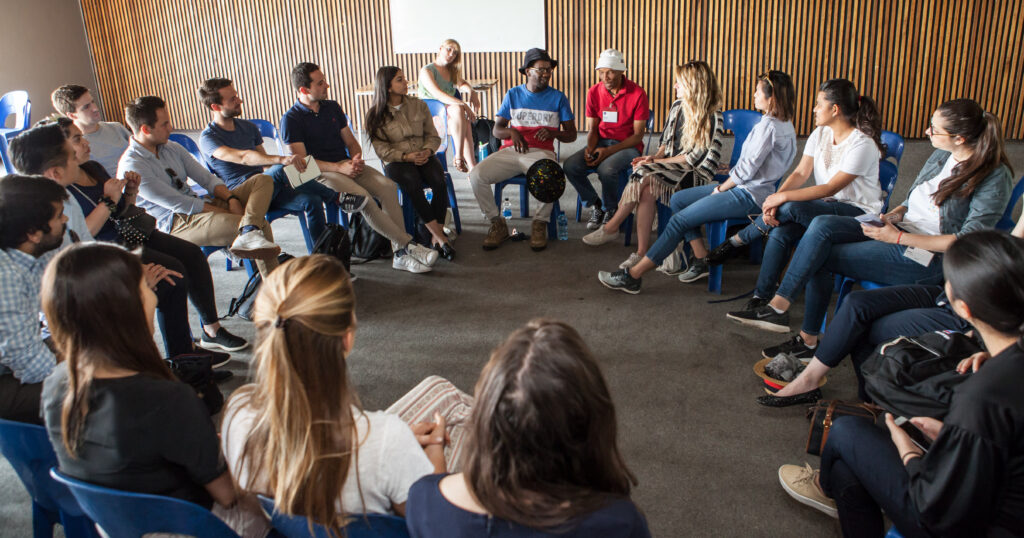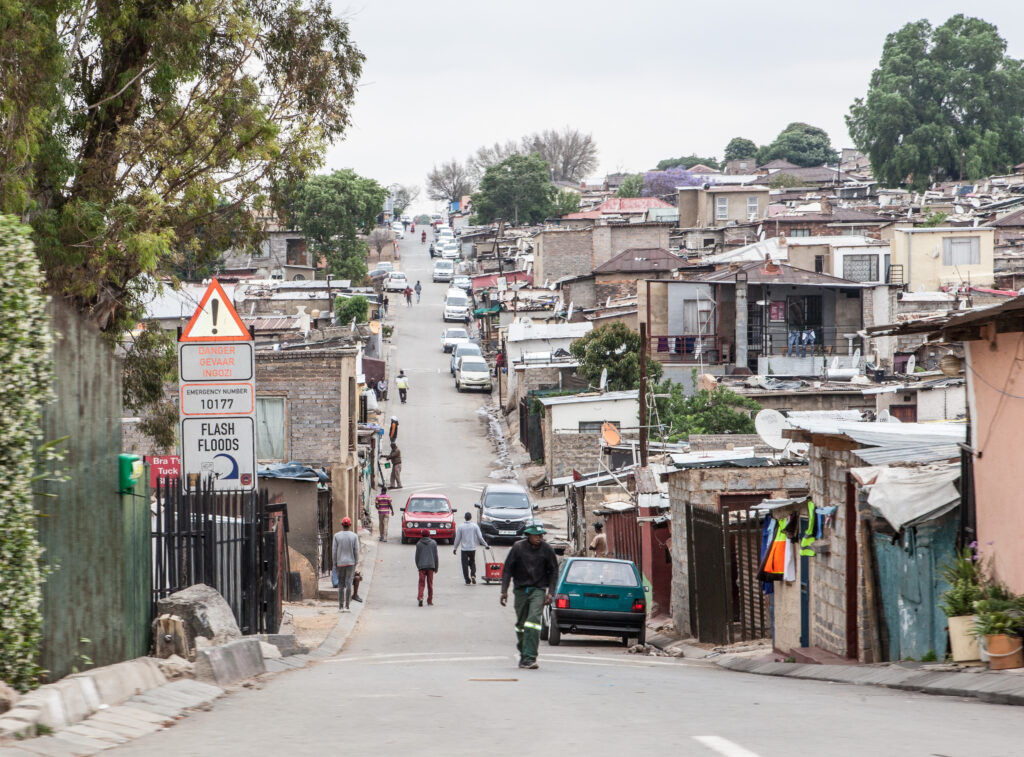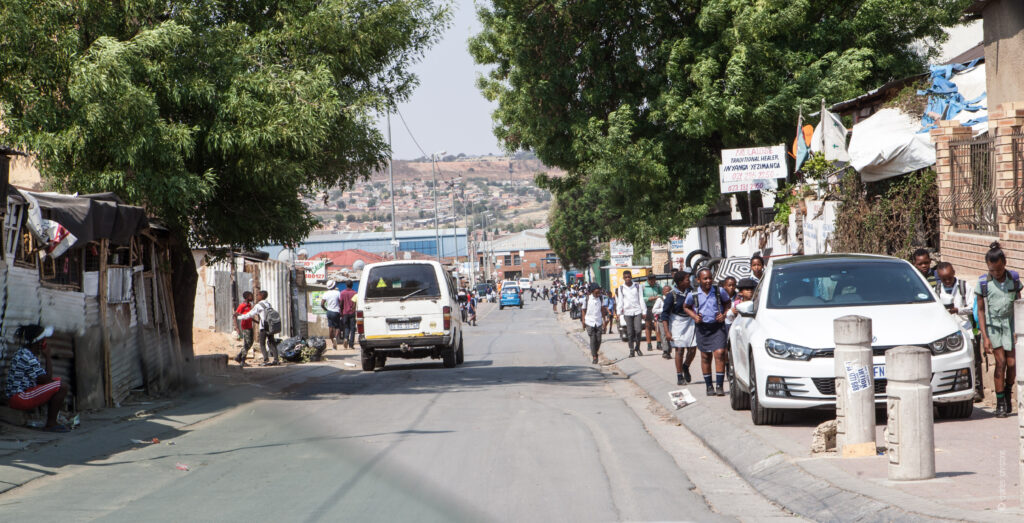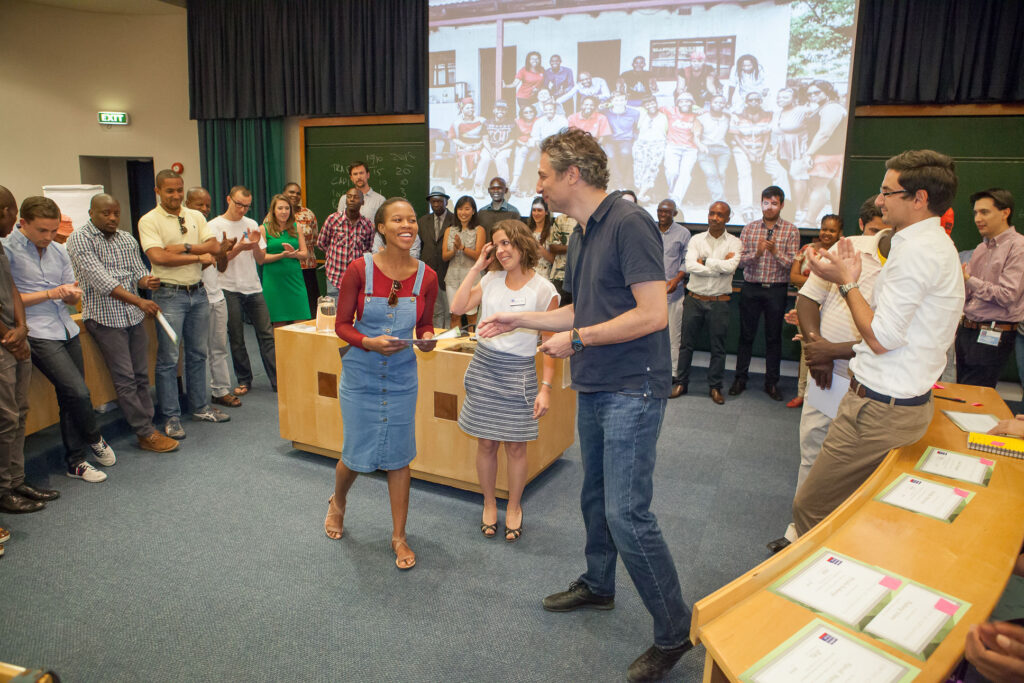At London Business School, learning happens far beyond the classroom. Two flagship experiential programs—the Johannesburg Global Business Experience (GBE) and Digital for Impact (DFI)—offer MBA students hands-on consulting opportunities in emerging markets. Both courses allow students to work directly with African entrepreneurs, but their design and delivery highlight different aspects of experiential learning. In a two-part blog series, one of our students explores the key features and differences of both programmes. The second part of the series can be found here.
The Johannesburg GBE is a five-day in-person immersion in Alexandra Township, one of Johannesburg’s most historically significant yet economically disadvantaged areas. Students spend a week on the ground, consulting with small businesses that form the backbone of Alex’s vibrant informal economy. By contrast, DFI is a five-week virtual course, where students work remotely with organizations in high-risk countries like Somalia, Chad, and Sudan—places often inaccessible for security reasons.
The Power of Place: Lessons from Alexandra
Alexandra—or “Alex” as it’s affectionately called—has a rich but turbulent history. Founded in 1912 as one of the only areas where black South Africans could own land, it became a symbol of resilience throughout apartheid, despite decades of forced removals, violence, and systemic neglect. Even today, the township is a study in contrasts: sprawling informal settlements exist side-by-side with pockets of prosperity, bustling markets hum with activity next to crumbling infrastructure, and local entrepreneurs fuel a microeconomy that refuses to be defined by hardship alone.
Walking through Alex, students encounter a living case study in complexity, resilience, and ingenuity—something that cannot be fully captured through Zoom screens or reports.
During the 2023 GBE, students worked with Mantwa’s Glam Hair, where they helped owner Mantwa Mashiloane improve her client acquisition strategy.[1] By investing in better signage outside her salon, Mantwa saw a radical increase in client walk-ins. She noted a shift from relying on impersonal Facebook ads to securing referrals through satisfied customers, demonstrating the tangible impact of focused marketing support.
Similarly, at Boitumelong Early Learning Centre, led by Nokulunga Ncube, students’ recommendations helped the day care thrive. The centre now boasts a baby room designed for infants, a vegetable garden that serves both as an educational tool and a source of extra revenue, and a renewed focus on becoming a registered Public Benefit Organisation (PBO). Nokulunga’s commitment to holistic child development was amplified through this collaboration, showcasing how targeted advice can spark broader social change.


Time, Trust, and Depth: Advantages of Virtual Engagement
While the Johannesburg GBE immerses students in a sensory, fast-paced environment, DFI provides a different form of depth. Spanning five weeks, the virtual course enables students to build longer-term relationships with clients, engage in multiple feedback loops, and deliver more sophisticated, iteratively developed solutions.
Students working with organizations in fragile contexts—like tech startups in Mogadishu or education nonprofits in Chad—learn how to navigate challenges of connectivity, cultural differences, and institutional fragility. Virtual consulting demands a different kind of empathy: students must ask deeper questions, actively listen across cultures, and interpret nuances without physical context clues.
And while virtual, the work remains visceral. Many DFI clients operate in areas facing political instability, famine, or violence. Students gain a profound appreciation for resilience under extreme conditions, sharpening not only their consulting skills but their broader worldview.
Strengths and Trade-Offs: In-Person vs. Virtual
Both formats have distinctive advantages—and unavoidable constraints.
- In-Person (GBE Johannesburg): The physical immersion fosters instant connection. Students can read body language, visit client sites, observe customer behaviour firsthand, and intuitively grasp market dynamics. Contextual details that might not be articulated over a video call—the atmosphere of a marketplace, the trust dynamics between vendors and customers, or even infrastructure challenges—are immediately visible. But with only five days, time is scarce. There’s a constant balancing act between proposing ambitious strategies and delivering actionable, realistic recommendations that clients can implement immediately.
- Virtual (Digital for Impact): The extended timeline of five weeks allows for deeper diagnostics, iterative planning, and tailored deliverables. Students have more time to build relationships, co-create solutions, and test ideas with clients across multiple touchpoints. However, physical distance can limit empathy, and understanding the nuances of local realities often depends entirely on how well clients can describe their environments virtually—something that is not always easy or accurate. Students must be highly intentional in asking questions and avoid making assumptions.


The COVID-19 pandemic dramatically accelerated the normalization of virtual consulting. During lockdowns, virtual engagement was not a choice but a necessity. Organizations across Africa adapted quickly, with many entrepreneurs embracing tools like WhatsApp, Zoom, and mobile money platforms to maintain operations. This digital pivot opened new avenues for collaboration that would have previously been considered impractical or impossible. Virtual consulting democratized access to global expertise—making it possible for businesses in conflict-affected or remote regions to receive support without requiring risky travel.
However, the pandemic also exposed the digital divide in stark terms. Many microentrepreneurs lacked stable internet connections, digital literacy, or reliable electricity, which sometimes made virtual consulting uneven or inaccessible. Some thrived, others struggled. Today, the legacy of COVID-19 is a hybrid consulting model, combining the immediacy of in-person immersion with the flexibility and inclusiveness of virtual collaboration.
More Than Consulting: Building Leadership Skills for a Global Economy
Experiential learning through courses like the GBE and DFI doesn’t just teach students how to solve business problems—it trains future leaders to work across boundaries of geography, culture, language, and economic disparity.
Whether advising a South African hair salon owner recovering from personal setbacks, an Alexandra preschool director expanding holistic programs, or a Somali fintech startup operating amid political upheaval, students gain critical competencies: cultural humility, adaptability, systems thinking, and resilient problem-solving.
As the global business landscape becomes more interconnected and more fragile, these are not “soft” skills. They are survival skills. By confronting real-world challenges in diverse formats, London Business School students don’t just learn about impact—they practice it.
Citations
[1] https://reciprocity.africa/lbs-gealex23-meet-up
About the author

Keertana Anandraj (MBA 2026) is an intern at the Wheeler Institute for Business and Development. Prior to joining London Business School she was a member of the International Sustainability Standards Board’s Technical Staff where she helped develop the first-ever global sustainability standards on climate-related risks and opportunities. A graduate of Wellesley College, Keertana is passionate about the role businesses can play in tackling the climate crisis.
